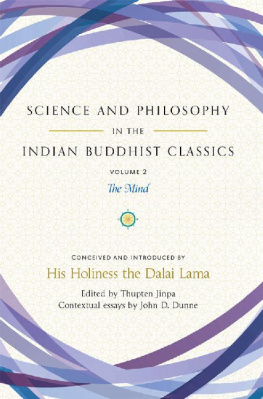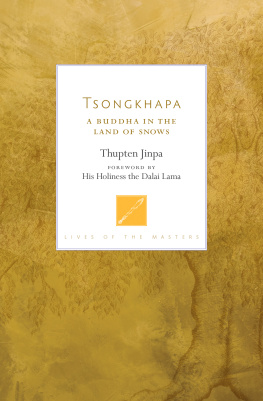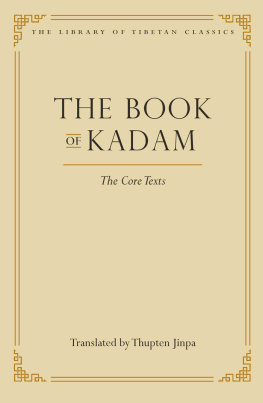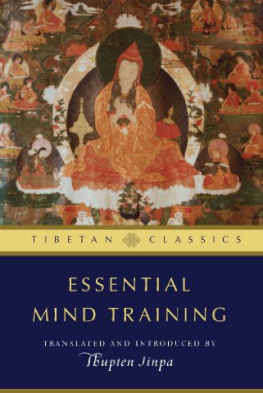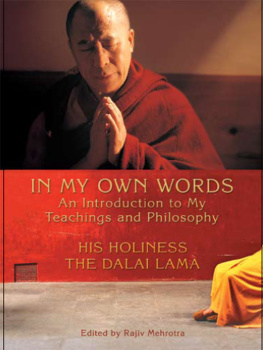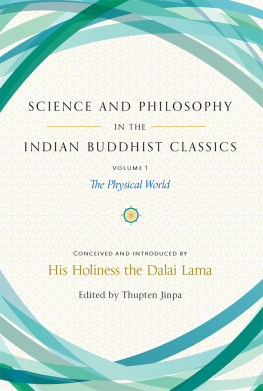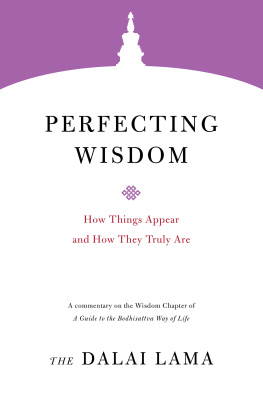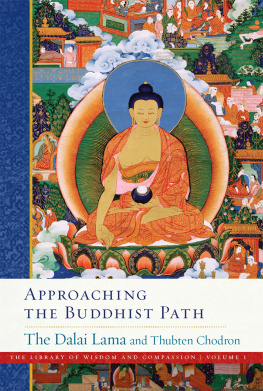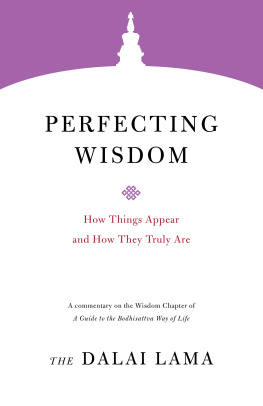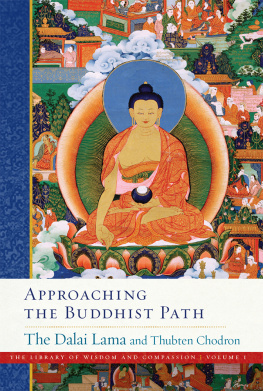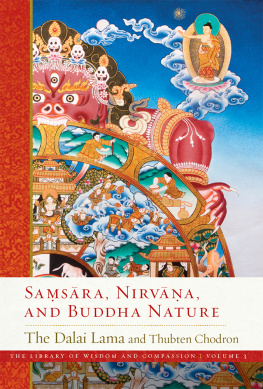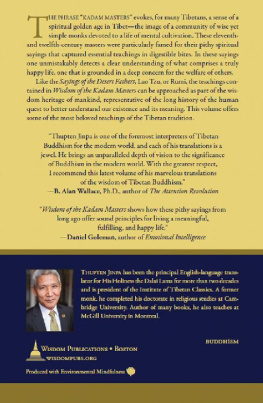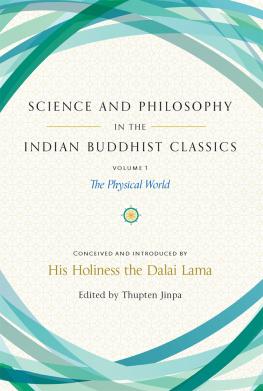COMPENDIUM COMPILATION COMMITTEE
Chair
Thamthog Rinpoche, Abbot of Namgyal Monastery
General Series Editor
Thupten Jinpa, PhD
Advisory Members
Geshe Yangteng Rinpoche, Sermey Monastic College
Geshe Thupten Palsang, Drepung Loseling College
Gelong Thupten Yarphel, Namgyal Monastery
Editors
Geshe Jangchup Sangye, Ganden Shartse College
Geshe Ngawang Sangye, Drepung Loseling College
Geshe Chisa Drungchen Rinpoche, Ganden Jangtse College
Geshe Lobsang Khechok, Drepung Gomang College
Explore the Buddhist view of consciousness how it works and how it is transformed in this unique sourcebook conceived by the Dalai Lama.
One sign that the Buddhist tradition is alive and well today, continuous with its classical roots and in dialogue with the modern world, is the revival of the classical Indian compendium, in which a topic is explored in detail through selections from canonical texts. Some of contemporary Tibets most distinguished scholars have produced an elegant compendium of Indian Buddhist psychological and epistemological literature, which has been translated with exemplary clarity and brought into dialogue with contemporary thought through precise scholarly introductions to each section. This is a valuable reference for anyone interested in philosophy of mind, epistemology, and psychology.
Jay L. Garfield, FAHA, Doris Silbert Professor in the Humanities and professor of philosophy, logic, and Buddhist studies at Smith College and Harvard Divinity School
A readable, modern compendium of doctrines and sources in the venerable tradition of Indian Buddhist scholastics. The translation is accessible and accurate, and each section begins with a clear, engaging essay that introduces and contextualizes key themes and topics.
Jonathan C. Gold, Princeton University, author of Paving the Great Way: Vasubandhus Unifying Buddhist Philosophy
This second volume in this remarkable series will be of great interest to philosophers, psychologists, and all concerned with the science of the mind. The depth of the Buddhist science of the mind is breathtaking.
Richard J. Davidson, founder and director, Center for Healthy Minds, University of WisconsinMadison
The genesis of science that took place in South Asia was just as demanding in terms of empirical accuracy, explanatory standards, and theoretical ingenuity as science in the West. Unlike modern science, however, it included the experience of meditation among its basic sources of knowledge. This broadening of the empirical horizon promises to trigger a new Renaissance. We are fortunate that the editors here have offered us such a clear presentation of this exceptional resource.
Michel Bitbol, CNRS (The National Center for Scientific Research), Paris
A truly indispensable sourcebook.
Jos Ignacio Cabezn, Dalai Lama Professor of Tibetan Buddhism and Cultural Studies, University of California Santa Barbara
Contents

Preface

GENERAL EDITORS NOTE
IT IS A REAL JOY to see in print this special volume presenting ideas and insights of classical Buddhist thought on the important topic of the mind and its potential for transformation. This is the second volume in Science and Philosophy in Indian Buddhist Classics, a unique series conceived by and developed under the supervision of His Holiness the Dalai Lama. While the first volume looked at the physical world, this volume investigates the science of the mind. Volumes 3 and 4 in the series, currently being prepared, present the philosophical insights of great Indian Buddhist thinkers.
An important premise behind the series, as His Holiness the Dalai Lama outlines in his own lengthy introduction, is the differentiation of the subject matter of Buddhist texts into the three domains of science, philosophy, and religion. He believes that while the last domain is relevant primarily to practicing Buddhists, the first two science and philosophy as found in the classical Buddhist sources can and should be recognized as part of global scientific and philosophical heritage. I urge the reader thus to engage first with the lengthy introduction in which His Holiness outlines in detail his vision, thought, and aspirations behind the creation of the four-volume series, and this volume on Buddhist mind sciences in particular. The opening and closing of his introduction match that of volume 1, with material unique to this volume in between.
One hallmark of ancient Indian systems of thought is their careful inquiry into the nature, function, and trainability of the human mind, with the Buddhist tradition especially excelling in this domain. Beginning with the Buddha himself, going back more than two and half millennia, the Buddhist tradition has emphasized critical inquiry into ones own mind as an indispensable path to self-mastery, spiritual transformation, and enlightenment. A famous statement attributed to the Buddha tells us that the mind is the forerunner of everything and that the person who has mastered the mind has found true peace. More systematic scientific and philosophical approaches emerged in Buddhist tradition a few centuries following the Buddhas death, just before the dawn of the Common Era. Scholars refer to this phase as the Abhidharma period, when, not unlike the story behind the creation of the Oxford English Dictionary, the large corpus of teachings attributed to the Buddha were compiled according to diverse systems of classification. A landmark in this Abhidharma period was the creation of the exhaustive anthology known as the Great Explanation (Mahvibha), dated to the first or second century CE. We see in this compendium one of the first known systematic presentations of what might be called a map of the human mind. At the heart of this mind map is a distinction between the mind and mental factors, the first referring to the basic fact of awareness and the latter referring to aspects or dimensions of our mental life, defined in terms of their distinct functions. Our volume represents the broadest resource in English on this important dimension of classical Buddhist mind sciences.
Roughly speaking, our volume presents in a distilled manner four distinct aspects of classical Buddhist thought related to the discipline of mind science. First and foremost is this Abhidharma analysis of mental factors their classifications, definitions, functions, and proximate conditions. Part 2 of our volume, the longest section, is a comprehensive presentation of these mental factors, based primarily on Asagas Compendium of Knowledge, but including also critical comparisons with other important Abhidharma sources, such as the Theravda Abhidhamma. This lengthy section of the volume is of special importance to contemporary psychology and neuroscience, as well as those interested in understanding the larger context of Buddhist-derived completive practices like mindfulness and compassion training. The second dimension of Buddhist mind science presented in our volume relates to what scholars refer to as Buddhist epistemology (prama), especially as developed by Dignga (fifthsixth century) and Dharmakrti (sixth century). Parts 1, 4, and 5 of our volume presents theories and insights from this classical resource in terms of three key themes of (1) the nature and definition of the mind, including especially a distinction between perceptual and conceptual minds, (2) the mind and its object, including a typology of cognition based on understanding the manner in which the mind engages its objects, and (3) systems of reasoning that can lead to correct inference about both the world and our own mind. The third dimension of Buddhist mind sciences, presented in part 3 of our volume, pertains to the unique perspective of Buddhist tantra, which views the mind and body as ultimately nondual, and to the meditation techniques based on such a view. The fourth and final aspect of Buddhist mind sciences presented in our volume, in part 6, are the theories and methods of mental training, including especially the cultivation of calm abiding (

